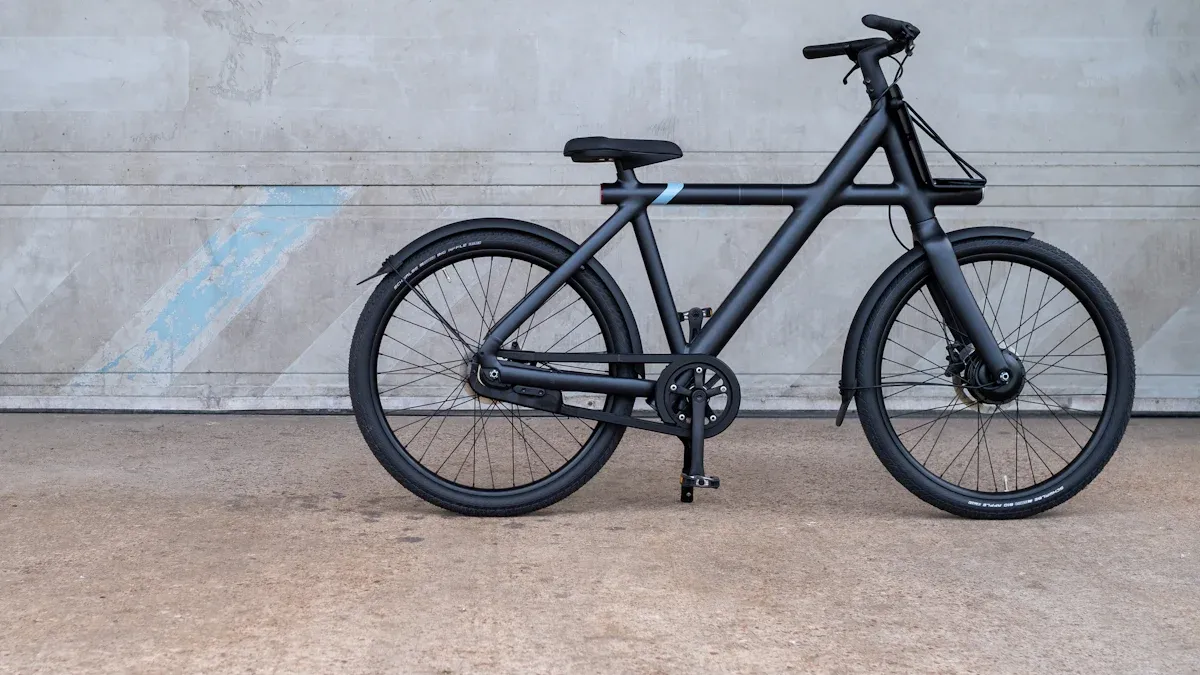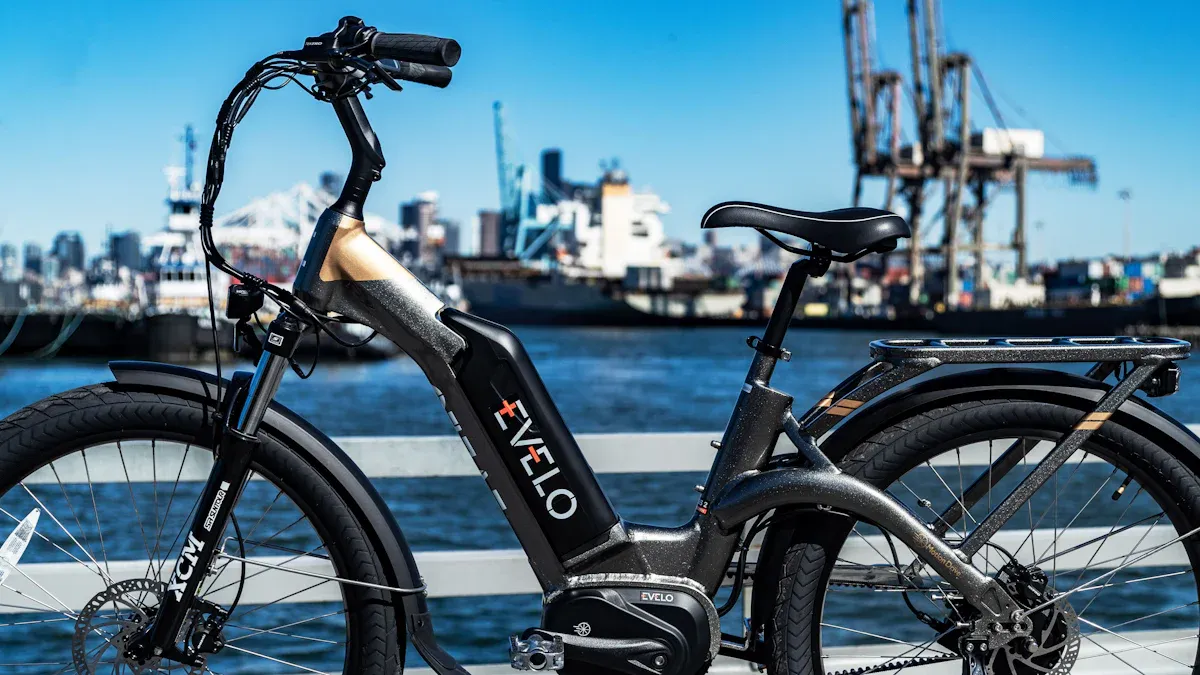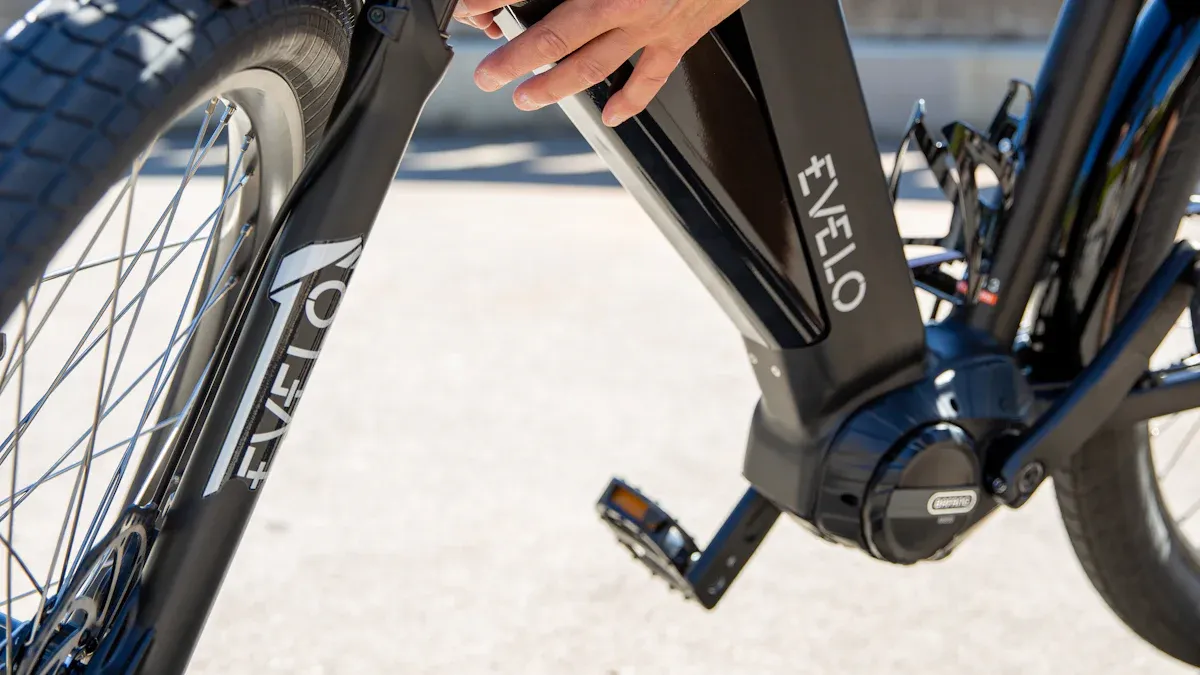
You can choose from many electric bike frame styles. Some popular options include step-through, step-over, mid-step, folding, cruiser, mountain, fat bike, cargo or utility, moto-style, and BMX-style frames. Each frame electric bike design serves different purposes. Some riders use their bikes for commuting to work, while others prefer off-road adventures. Electric bike frames are typically made from materials like aluminum or carbon fiber. Carbon fiber frames provide a smoother ride by absorbing more bumps but require special care. Aluminum frames are more affordable and better at handling impacts. Consider your comfort and riding plans when selecting the frame electric bike style that best fits your lifestyle.
Key Takeaways
Pick an electric bike frame style that matches how you ride and what feels good. Step-through frames are easy to get on. Mountain frames work well for rough paths.
Frame materials like aluminum, steel, carbon fiber, and titanium change how heavy the bike is. They also change how smooth the ride feels, how long the bike lasts, and how much it costs.
Step-through frames are simple to use and feel comfy. Step-over frames are stronger and better for sporty rides.
Folding frames are easy to store and take on trips. They can feel bumpier when you ride. Fat tire frames help you stay steady on snow and sand, but they are heavier.
Try riding different frames and check the sizes. This helps you find what fits your body and how you like to ride.
Frame Electric Bike Types

Step-Through Frame
A step-through frame electric bike has a low or missing top tube. This makes a big open space between the seat and handlebars. You can get on and off easily without lifting your leg high. Most step-through frames use aluminum alloy. This makes them strong, light, and keeps them from rusting. The frame is made stronger in important spots to stay safe. You might see safety marks like UL or CE on these bikes.
Pros:
Very easy to get on and off, even if you have trouble moving or wear normal clothes.
Upright riding makes you comfortable and helps you see better.
Great for city rides and stopping often.
Helps new riders feel more confident.
Cons:
Some people think step-through frames are weaker than step-over bikes, but new designs are better.
Not the best for rough roads or carrying heavy things.
Tip: Step-thru bikes are good for older people, people who ride to work, and anyone who wants comfort and easy use.
Step-Over Frame
Step-over bikes have a classic diamond-shaped frame with a high top tube. You need to swing your leg over the frame to get on or off. This design makes the electric bike frame stronger and stiffer.
Feature | Step-Through Frame | Step-Over Frame |
|---|---|---|
Very easy, step through the frame | Need to swing your leg over | |
Accessibility | High, good for people who can’t move well | Less easy, needs more movement |
Riding Posture | Upright and relaxed | Lean forward, sporty |
Use Case | City rides, lots of stops | Fast rides, rough trails, more power |
Pros:
Strong frame helps you pedal harder.
Handles well, even on bumpy ground.
Sporty look that many people like.
Good for tall riders.
Cons:
Harder to get on for people who can’t move well.
Not as comfy for city rides or stopping a lot.
Mid-Step Frame
A mid-step electric bike frame is between step-through and step-over. The top tube is lower than a step-over but higher than a step-through. This makes it easier to get on than a step-over, but still strong and steady.
Feature | Description |
|---|---|
Frame Type | Lower height so it’s easier to get on |
Motor Mount | Stronger for the motor’s power |
Battery Placement | In the middle and low for better balance |
Handlebars | BMX style for better control |
Suspension | Front fork helps with bumps |
Brakes | Hydraulic with motor cut-off |
Pros:
Easier to get on and off than step-over bikes.
Good mix of comfort and performance.
Strong and steady, works for many people.
Cons:
Not as easy to use as step-thru bikes.
A bit heavier because of extra parts.
Folding Frame
Folding electric bike frames have hinges so you can fold the bike. This makes it much smaller for storage or travel. You can put a folding bike in a closet, under a desk, or in a car trunk.
Folding bikes are great for people with little space at home.
You can take them on trains, buses, or even planes (check battery rules).
Keeping your bike inside helps stop theft.
Pros:
Saves space at home or work.
Easy to bring on public transit.
Good for trips that use both bike and bus or train.
Cons:
Small wheels make rides bumpier and less steady.
Hinges and joints can get loose and need fixing.
Heavier than they look because of folding parts.
Cruiser Frame
Cruiser electric bike frames are made for comfort and style. They have a relaxed shape, wide handlebars, and big soft seats. The frame is often easy to get on.
Wide tires help smooth out bumps.
Sitting upright helps your back and wrists feel better.
Pros:
Very comfy for short, flat rides.
Easy to get on and off.
Looks cool and is fun for beach or neighborhood rides.
Cons:
Not good for hills or long rides.
Heavier and not as quick as other bikes.
Note: Cruiser frames are best for easy, fun rides on smooth paths.
Mountain Frame
Mountain electric bike frames are made for off-road riding. They use strong materials like aluminum or carbon fiber. The parts are tough to handle rough trails and the weight of motors and batteries.
The frame shape helps you stay steady on bumpy ground.
Full-suspension models soak up shocks for a smoother ride.
Pros:
Works well on rough ground and steep hills.
Strong and lasts long for trail riding.
You can change pedal assist for different trails.
Cons:
Heavier because of the motor and battery.
Costs more and is harder to fix.
Fat Bike Frame
Fat bike electric frames use very wide tires (4 to 5 inches). This spreads your weight out more. It helps you ride on snow, sand, or mud without sinking.
Terrain | Tire Width | Tire Pressure (PSI) | Motor Power (W) | Benefit |
|---|---|---|---|---|
Sand | 4-5 in | 5-10 | 750+ | Stops sinking, smooth ride |
Snow | 4-5 in | 5-15 | 750+ | Better grip and control |
Pros:
Great for snow, sand, and loose ground.
Fat tires soak up bumps for a comfy ride.
Strong motors help on tough ground.
Cons:
Heavy and harder to turn in small spaces.
Battery does not last as long because of tire drag.
Big size makes it hard to store and move.
Fat tire electric bikes give up speed and quick turns for better balance and riding on many surfaces.
Cargo/Utility Frame
Cargo or utility electric bike frames are made to carry heavy things. They have strong frames, tough tires, and special racks or boxes for stuff.
Design Feature | Description and Purpose |
|---|---|
Built to carry heavy loads (often over 200 pounds including rider), making sure it’s safe and steady. | |
Dedicated Cargo Area | Has front boxes, back racks, or long tails for different cargo. |
Frame Types | Two wheels for easier turning; three wheels for more cargo. |
Reliable Braking System | Keeps you safe when carrying heavy or big loads. |
Proper Load Distribution | Helps keep balance and steady riding when loaded. |
Pros:
Can carry groceries, kids, or work gear easily.
Stays steady and safe, even with heavy loads.
Good for families or delivery jobs.
Cons:
Heavier and not as quick as regular bikes.
Slower top speed and not as easy to turn.
Needs more space to park and store.
Moto-Style Frame
Moto-style electric bike frames look like small motorcycles or mopeds. They have step-through frames, wide soft seats (sometimes for two people), and big fat tires. These bikes use strong motors and often have both pedal assist and throttle.
Feature | Moto-Style Electric Bike Frames | Traditional Bicycle Frames |
|---|---|---|
Frame Design | Step-through, strong, easy to get on | Light, diamond or step-over |
Seating | Wide, soft, bench-style | Narrower, sport or upright |
Tires | Big, fat, steady | Standard, lighter |
Suspension | Both front and back | Just front or none |
Controls | Throttle and pedal assist | Pedal-assist only |
Weight & Purpose | Heavier, made for comfort | Lighter, made for quick moves |
Pros:
Strong motors for speed and climbing hills.
Soft seats and relaxed riding position.
Fat tires and suspension work well on rough roads.
Can carry people or heavy things.
Cons:
Heavier and bigger, harder to store.
Costs more than regular e-bikes.
Some may need special licenses.
BMX-Style Frame
BMX-style electric bike frames are made for tricks and stunts. They use strong materials like chromoly steel or aluminum. The frame is small and low with 20-inch wheels. The design helps with quick moves and lasting a long time.
Mid-drive motors help balance the bike for tricks.
You can take out the battery to make it lighter for practice.
Strong parts like double-wall rims and tough cranksets handle hard landings.
Pros:
Very quick and easy to turn.
Great for skateparks, city riding, and tricks.
Strong frame can handle jumps and stunts.
Cons:
Not comfy for long rides.
Not much space for cargo and less steady at high speeds.
Small wheels make rough ground harder to ride on.
BMX-style frames are for riders who want to do tricks and need a strong, quick electric bike frame.
Electric Bike Frame Materials

The material of your electric bike frame is important. It changes how your bike feels and how heavy it is. It also affects how long your bike lasts and how much it costs. Let’s check out the main choices you will see.
Aluminum
Most electric bikes use aluminum frames today. You see them a lot because they are light and strong. They also do not cost too much.
Aluminum frames are lighter than steel. This helps you ride faster and makes turning easier.
They cost less than carbon fiber or titanium. This makes them good for people who want to save money.
Aluminum does not rust, so rain is not a big problem.
These frames let you pedal hard, but you might feel more bumps. That is because aluminum is stiff.
Most e-bikes use aluminum since it is strong and keeps the price low.
Tip: Pick aluminum if you want a bike that is light, cheap, and easy to care for.
Steel
Steel frames give you a classic feel. They are very strong and last a long time.
Steel soaks up bumps, so your ride feels smoother.
If steel gets damaged, you can fix it by welding.
Steel is heavier than other materials. This can make you slower and use more battery.
Steel can rust if you do not keep it dry and clean.
Characteristic | Description |
|---|---|
Very strong and lasts a long time | |
Comfort | Smooth ride, soaks up shocks |
Weight | Heavier than aluminum or carbon fiber |
Maintenance | Needs care to stop rust |
Carbon Fiber
Carbon fiber frames are for people who want the best ride.
Carbon fiber is very light. This makes your bike easy to pedal and carry.
It soaks up road bumps, so your ride is smoother.
You can shape carbon fiber to go faster.
These frames cost a lot more than aluminum or steel.
Carbon fiber can crack if you hit something hard. Fixing it is not easy.
Note: Carbon fiber bikes are fast and smooth, but they cost a lot.
Titanium
Titanium frames are rare and special. They mix the best things from other materials.
Advantage | Explanation |
|---|---|
Lightweight and durable | Titanium is as light as aluminum and as strong as steel. |
Corrosion resistance | It does not rust, even in wet weather. |
Titanium soaks up bumps for a smooth ride. | |
Longevity | With care, a titanium frame can last a lifetime. |
Disadvantage | Explanation |
|---|---|
Expensive | Titanium bikes cost a lot, even more than carbon fiber. |
Less common | You may need to order a custom frame. |
Titanium frames are great for long rides and tough trips, but they cost a lot.
Electric Bike Frame Comparison
Frame Style Table
Picking the right electric bike frame helps you ride better. Think about how easy it is to get on. Check if the frame feels strong. Make sure it fits your daily needs. The table below lists main frame styles. It shows what each style is best for. You can see what is good and bad about each one.
Frame Style | Best For | Pros | Cons |
|---|---|---|---|
Step-Through | City, frequent stops | Easy access, upright comfort | Less stiff, not for heavy loads |
Step-Over | Sport, rough terrain | Strong, good power transfer | Harder to mount, less comfort |
Mid-Step | Mixed use | Balance of comfort and strength | Heavier, not as easy as step-through |
Folding | Commuting, travel | Compact, portable | Bumpier ride, heavier than expected |
Cruiser | Leisure, flat paths | Very comfortable, stylish | Heavy, slow, not for hills |
Mountain | Trails, off-road | Tough, handles bumps | Heavy, expensive |
Fat Bike | Snow, sand, loose ground | Stable, absorbs shocks | Heavy, short battery life |
Cargo/Utility | Carrying loads | High capacity, safe with cargo | Bulky, slow, needs space |
Moto-Style | Comfort, speed | Powerful, soft seat, good suspension | Heavy, costly, may need license |
BMX-Style | Tricks, skateparks | Quick, strong for stunts | Uncomfortable, not for distance |
Tip: If you ride in the city and stop a lot, step-through or folding frames are best. For rough trails, mountain or fat bike frames help you control the bike.
Material Table
The frame material changes how your bike feels and lasts. It also affects how much your bike weighs. Compare weight, strength, comfort, and price before you pick. The table below lists the main materials. It shows their features and what they are best for.
Material | Weight | Strength | Cost | Corrosion Resistance | Comfort/Durability | Best For |
|---|---|---|---|---|---|---|
Aluminum | Moderate | Good | Moderate | Good | Firm ride, less durable | Everyday, budget riders |
Steel | Heavy | Very strong | Moderate | Needs care | Smooth, very durable | Touring, comfort seekers |
Carbon Fiber | Very light | High stiffness | High | Excellent | Smooth, brittle | Performance, long commutes |
Titanium | Light | Strong | Very high | Excellent | Smooth, lasts long | Premium, long-distance |
Note: Aluminum frames are easy to care for and cost less. Carbon fiber gives a smooth ride but needs careful use. Steel lasts a long time but is heavy. Titanium is the best mix but costs the most.
Think about how much weight you want to carry. Decide how smooth you want your ride. Think about your budget. Each material has good and bad points. Aluminum is good for daily rides. Carbon fiber or titanium are better for top performance.
Choosing the right electric bike frame style and material helps you enjoy every ride. Match your frame to your height, riding habits, and comfort needs. Try these expert tips:
Test ride different frame styles to find the best fit.
Check frame size for proper clearance and comfort.
Pick frame material based on your budget, weight needs, and riding plans.
Ask professionals for advice on frame and motor setup.
Make sure your frame supports accessories you want to use.
Your comfort and long-term satisfaction matter most. Take time to find the perfect match.
FAQ
What electric bike frame is easiest to get on and off?
Step-through frames let you get on and off quickly. You do not need to lift your leg high. This style works well for city rides and for people who want comfort.
Tip: Try a step-through frame if you wear work clothes or have limited movement.
Which frame material lasts the longest?
Steel and titanium frames last many years. Steel resists damage and can be fixed. Titanium does not rust and stays strong. Both materials give you a smooth ride.
Material | Durability | Rust Resistance |
|---|---|---|
Steel | High | Low |
Titanium | Very High | Very High |
Can I use a folding electric bike for daily commuting?
You can use a folding electric bike for daily trips. It fits in small spaces and travels well on buses or trains. Small wheels make the ride bumpier, but you save space.
Are fat tire electric bikes good for beginners?
Fat tire electric bikes help you balance better. Wide tires grip the ground and soak up bumps. You may find them heavy, but they feel stable on many surfaces.
How do I choose the right frame size?
Measure your height and leg length. Check the bike’s size chart. Stand over the frame to see if you have space. You should feel comfortable and reach the handlebars easily.
Note: Test riding helps you find the best fit for your body.
